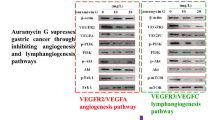Abstract
Objective
This study investigated the inhibitory effects of bevacizumab monoclonal antibodies in combination with chemotherapy in different time sequences on a human gastric cancer cell line (MGC-803).
Methods
Cultured MGC-803 human gastric cancer cells were treated with bevacizumab in combination with chemotherapy treatment in different time sequences. The effects on cell growth inhibition were determined using the 3-(4,5-dimethylthiazol-2-yl)-2,5-diphenyltetrazolium bromide assay. Cell cycle distribution and the rate of cell apoptosis were determined by propidium iodide staining followed by flow cytometry.
Results
Drug administration for different time sequences significantly inhibited the growth of MGC-803 cells. Based on group comparisons (P < 0.01), the effect of 24 h bevacizumab treatment prior to combination 5-fluorouracil and cisplatin (FP) was the strongest (F = 241.313, 246.856, all P values <0.001). Treating MGC-803 cells with bevacizumab for 24 h before combination FP induced significant G2/M phase arrest (F = 231.991, P < 0.001) and significantly increased gastric cancer cell apoptosis. Bevacizumab in combination with chemotherapy significantly inhibits the proliferation of MGC-803 gastric cancer cells.
Conclusions
The mechanism may be related to cell cycle arrest at S phase and the induction of apoptosis in MGC-803 gastric cancer cells.
Similar content being viewed by others
References
Casaretto L, Sousa PL, Mari JJ (2006) Chemotherapy versus support cancer treatment in advanced gastric cancer: a meta-analysis. Braz J Med Biol Res 39:431–440
Wagner AD, Grothe W, Haerting J et al (2006) Chemotherapy in advanced gastric cancer: a systematic review and metaanalysis based on aggregate data. J Clin Oncol 24:2903–2909
Bang YJ, Van Cutsem E, Feyereislova A et al (2010) Trastuzumab in combination with chemotherapy versus chemotherapy alone for treatment of HER2-positive advanced gastric or gastro-oesophageal junction cancer (ToGA): a phase 3, open-label, randomised controlledtrial. Lancet 376:687–697
Aoyagi K, Kouhuji K, Kizaki J et al (2014) Molecular targeting to treat gastric cancer. World J Gastroenterol 20:13741–13755
Thiel A, Ristimäki A (2015) Targeted therapy in gastric cancer. APMIS 123:365–372
Booy EP, Johar D, Maddika S et al (2006) Monoclonal and bispecific antibodies as novel therapeutics. Arch Immunol Ther Exp (Warsz) 54:85–101
Jain VK, Hawkes EA, Cunningham D (2011) Integration of biologic agents with cytotoxic chemotherapy in metastatic colorectal cancer. Clin Colorectal Cancer 10:245–257
Aprile G, Ongaro E, Del Re M et al (2015) Angiogenic inhibitors in gastric cancers and gastroesophageal junction carcinomas: a critical insight. Crit Rev Oncol Hematol 95:165–178
Han K, Jin J, Maia M et al (2014) Lower exposure and faster clearance of bevacizumab in gastric cancer and the impact of patient variables: analysis of individual data from AVAGAST Phase III trial. The AAPS J 16:1056–1063
Browder T, Butterfield CE, Kräling BM et al (2000) Antiangiogenic scheduling of chemotherapy improves efficacy against experimental drug-resistant cancer. Cancer Res 60:1878–1886
Bello L, Carrabba G, Giussani C et al (2001) Low-dose chemotherapy combined with an antiangiogenic drug reduces human glioma growth in vivo. Cancer Res 61:7501–7506
Ramalingam SS, Dahlberg SE, Langer CJ et al (2008) Outcomes for elderly, advanced-stage non small-cell lung cancer patients treated with bevacizumab in combination with carboplatin and paclitaxel: analysis of Eastern Cooperative Oncology Group Trial 4599. J Clin Oncol 26:60–65
Peng XC, Qiu M, Wei M et al (2012) Different combination schedules of gemcitabine with endostar affect antitumor efficacy. Cancer Chemother Pharmacol 69:239–246
Xu WJ, Huang C, Wang J et al (2011) Comparison of the effects of recombinant human endostatin and docetaxel on human umbilical vein endothelial cells in different growth states. Chin Med J (Engl) 124:2883–2889
Yuan ZY, Liu XB, Zhuang HQ et al (2011) Radiosensitizing effects of h-R3 with different time series of administration on human lung cancer cells expressing various EGFR levels. Chin J Clin Oncol 38:1019–1023
Lei X, Lv X, Liu M et al (2012) Thymoquinone inhibits growth and augments 5-fluorouracil induced apoptosis in gastric cancer cells both in vitro and in vivo. Biochem Biophys Res Commun 417:864–868
Zheng YB, Xiao GC, Tong SL et al (2015) Paeoniflorin inhibits human gastric carcinoma cell proliferation through up-regulation of microRNA-124 and suppression of PI3 K/Akt and STAT3 signaling. World J Gastroenterol 21:7197–7207
Kim MK, James J, Annunziata CM (2015) Topotecan synergizes with CHEK1 (CHK1) inhibitor to induce apoptosis in ovarian cancer cells. BMC Cancer 15:196
Bogusz J, Majchrzak A, Mędra A et al (2013) Mechanisms of action of the anti-VEGF monoclonal antibody bevacizumab on chronic lymphocytic leukemia cells. Postepy Hig Med Dosw (online) 67:107–118
Carneiro A, Falcão M, Pirraco A et al (2009) Comparative effects of bevacizumab, ranibizumab and pegaptanib at intravitreal dose range on endothelial cells. Exp Eye Res 88:522–527
Author information
Authors and Affiliations
Corresponding author
Ethics declarations
Conflicts of interest
All of the authors declare that they have no conflicts of interest regarding this paper.
Rights and permissions
About this article
Cite this article
Lv, Y., Song, L., Chang, L. et al. Inhibitory effects of bevacizumab monoclonal antibodies in combination with chemotherapy in different time sequences on a human gastric carcinoma cell line. Ir J Med Sci 186, 275–280 (2017). https://doi.org/10.1007/s11845-016-1471-1
Received:
Accepted:
Published:
Issue Date:
DOI: https://doi.org/10.1007/s11845-016-1471-1




